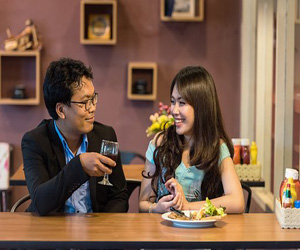


Understanding The Complex Forces At Play

Love, one of the most profound and universally experienced human emotions, is a complex and multifaceted phenomenon. It takes many forms, from the fiery passion of romantic love to the enduring bonds of familial love and the deep connections of friendship. Understanding the dynamics of love can help us appreciate its beauty and navigate the intricacies of our relationships. In this article, we explore the various dimensions and forces that shape the dynamics of love.
Romantic Love: The dynamics of romantic love are often marked by intense attraction, infatuation, and passion. It's characterized by a strong desire to be close to and connect with a romantic partner. This initial stage of love, often referred to as the "honeymoon phase," is marked by euphoria and a sense of being "in love."
Attachment: Love also involves an attachment component, which is marked by feelings of security and comfort derived from being close to a loved one. This is the stable and enduring aspect of love that can survive the initial fiery passion.
Intimacy: Intimacy in love relates to emotional closeness and sharing. It involves trust, vulnerability, and the willingness to share your innermost thoughts and feelings with your partner.
Commitment: Commitment refers to the decision to maintain the relationship and work through challenges. It's the deliberate choice to keep the bond strong even when the initial spark wanes.
Passion: Passion is the intense desire and attraction that characterizes the early stages of love. It's what draws people together, often marked by physical attraction and romantic excitement.
Companionate Love: As relationships mature, passionate love may evolve into companionate love. This is characterized by a deep friendship, trust, and companionship in the absence of the fiery passion.
Eros And Philia: Greek philosophers recognized different types of love. Eros is the romantic, passionate love, while Philia represents friendship and companionship. Both dynamics play significant roles in human relationships.
Self-Love: Understanding the dynamics of love also involves recognizing the importance of self-love. Loving oneself is the foundation upon which all other forms of love are built. It's about accepting oneself and having a healthy self-esteem.
Unconditional Love: This is a selfless form of love often experienced between parents and their children. It's a love without conditions, marked by unwavering support and care.
Empathy: Empathy is the ability to understand and share the feelings of others. It's a fundamental dynamic in love, as it allows us to connect with and support our loved ones.
Understanding the dynamics of love is not only about recognizing these different facets but also about appreciating how they interact and evolve within relationships. Love is not static; it changes over time and is influenced by various factors, including life experiences, external circumstances, and personal growth.
As relationships progress, the dynamics of love often involve a shift from the intense passion of the early stages to a deeper, more stable form of love that encompasses intimacy, attachment, and commitment. This transformation is a natural part of the journey, and it's what enables enduring relationships to thrive.
The dynamics of love are a fascinating and ever-evolving aspect of the human experience. Understanding these dynamics can help us navigate the complexities of our relationships, appreciate the multifaceted nature of love, and nurture the bonds that enrich our lives. Whether it's romantic love, familial love, or the love of friendship, love remains a profound and beautiful force that shapes our existence.
The Power Of Rekindling Romance And Finding A New Beginning
 Love again requires us to embrace vulnerability. This means allowing yourself to open up to the possibility of being hurt once more. Vulnerability is not a sign of weakness but rather an indication of your courage to be authentic and open in your connections. It's about letting down your guard and allowing someone new into your heart, even when it feels scary.
Love again requires us to embrace vulnerability. This means allowing yourself to open up to the possibility of being hurt once more. Vulnerability is not a sign of weakness but rather an indication of your courage to be authentic and open in your connections. It's about letting down your guard and allowing someone new into your heart, even when it feels scary.
Taking Things Slow
Love again often flourishes when we take things slow. Rushing into a new relationship might not allow you to process the past fully. Take the time to get to know someone on a deep level, understand their values, and let them know yours. Building a strong foundation takes time, but it's worth it in the end.
Learning From The Past
One of the most valuable aspects of learning to love again is the wisdom gained from past experiences. Reflect on the lessons your previous relationships taught you. Understand the red flags and make conscious choices to avoid repeating the same mistakes. Learning from the past is an essential step toward creating healthier and more fulfilling relationships in the future.
Support And Connection
Loving again can be made more comfortable by seeking support and connection. Friends, family, or even therapy can provide a safe space for you to express your feelings and gain insight.


Embracing Change And Growth
 Letting Go Of The Past: Moving on often involves letting go of the past. This doesn't mean forgetting your history but rather releasing the emotional burdens that may hold you back. It's about forgiving, healing, and freeing your spirit to embrace the new.
Letting Go Of The Past: Moving on often involves letting go of the past. This doesn't mean forgetting your history but rather releasing the emotional burdens that may hold you back. It's about forgiving, healing, and freeing your spirit to embrace the new.
Setting New Goals: Moving on signifies a new beginning. It's a chance to set new goals and aspirations, to envision what you want to achieve in this next phase of your life. Defining your goals provides direction and purpose.
Embracing Uncertainty: Change often brings uncertainty, and that can be intimidating. However, learning to embrace uncertainty can lead to personal growth and a sense of adventure. It's an opportunity to explore the unknown and to be open to the possibilities it brings.
Self-Reflection: Moving on allows for self-reflection. It's an excellent time to take stock of your life, your values, and your priorities. Understand what truly matters to you, and use this insight to shape your future.
Positive Support System: Surround yourself with a positive support system. Friends, family, or mentors can provide encouragement and guidance as you navigate your path. Their presence can make the journey more manageable and less lonely.
A Guide To Finding Love Again
 Self-Reflection: Before diving back into the dating pool, take some time for self-reflection. Consider what you've learned from past relationships, what you're looking for in a partner, and what you've discovered about yourself during your time away from dating. This self-awareness can guide your choices and help you avoid repeating past mistakes.
Self-Reflection: Before diving back into the dating pool, take some time for self-reflection. Consider what you've learned from past relationships, what you're looking for in a partner, and what you've discovered about yourself during your time away from dating. This self-awareness can guide your choices and help you avoid repeating past mistakes.
Set Realistic Expectations: It's crucial to have realistic expectations. Understand that the dating landscape may have changed since you were last active. People's preferences and communication methods evolve. Be open to new experiences and adapt to the current dating norms.
Online Dating: Online dating has become a prominent way to meet potential partners. It offers convenience and a wide pool of potential matches. Take time to create an honest and appealing profile, and choose reputable dating apps or websites that suit your preferences.
Open Communication: Effective communication is key to successful dating. Be open and honest with your potential partners about your dating goals, boundaries, and expectations. This transparency will help you find like-minded individuals.
Overcoming Nervousness: It's normal to feel nervous about reentering the dating scene, especially if you've been out of it for a while. Take it at your own pace and remember that it's okay to have some anxiety. Over time, as you engage in more conversations and dates, your confidence will naturally increase.
Expand Your Horizons: Don't limit yourself to your comfort zone. Be open to meeting people with various interests and backgrounds. You might be surprised by the connections you make with individuals you might not have considered in the past.
Safety First: Prioritize your safety. When meeting someone new, choose public places for your first few dates. Inform a friend or family member about your plans and trust your instincts. Your safety should never be compromised.
The Journey To Healing And Stronger Relationships
 3. Take Responsibility: If you are the one who breached trust, take responsibility for your actions. Acknowledge the impact of your behavior and express genuine remorse. Taking ownership of your mistakes is a significant step in the process.
3. Take Responsibility: If you are the one who breached trust, take responsibility for your actions. Acknowledge the impact of your behavior and express genuine remorse. Taking ownership of your mistakes is a significant step in the process.
4. Offer Apologies: A sincere apology can go a long way in rebuilding trust. Express your regret and offer a heartfelt apology. Be specific about what you are apologizing for, and ensure that your words are backed by genuine intent to make amends.
5. Set Clear Boundaries: In some cases, setting clear boundaries is necessary to prevent future breaches of trust. This may involve establishing guidelines and expectations for both parties to follow.
6. Consistency: Consistency is crucial in rebuilding trust. Demonstrating over time that you are committed to positive change and keeping your promises helps to rebuild confidence in your reliability.
7. Patience: Rebuilding trust takes time, and it's essential to be patient. Understand that the process is not linear, and there may be setbacks along the way. Keep your focus on the end goal of restoring trust.
8. Forgiveness: Forgiveness is a significant part of the process. Once the necessary steps have been taken to rebuild trust, forgiveness allows both parties to move forward. It is not about forgetting the past but letting go of the pain and anger associated with it.
9. Seek Support: If the breach of trust has caused deep emotional wounds, seeking professional help, such as couples therapy or counseling, can be beneficial. Professionals can provide guidance and strategies to facilitate the rebuilding of trust.
Navigating The Complex Terrain
 2. Baggage From The Past: One of the most significant challenges in post-divorce relationships is dealing with the baggage from your past marriage. It's easy to carry unresolved issues, trust concerns, or negative emotions into new relationships. Recognize the patterns and triggers from your previous marriage and actively work on addressing them.
2. Baggage From The Past: One of the most significant challenges in post-divorce relationships is dealing with the baggage from your past marriage. It's easy to carry unresolved issues, trust concerns, or negative emotions into new relationships. Recognize the patterns and triggers from your previous marriage and actively work on addressing them.
3. Redefining Priorities: Divorce often leads to a reevaluation of priorities and values. Use this opportunity to redefine what matters most to you in a relationship. It's an occasion to establish healthier boundaries and create a vision of what you truly want in a partner.
4. Communication: Effective communication is vital. Post-divorce relationships benefit from open and honest discussions about your past experiences, expectations, and goals. Learning to express your needs and actively listen to your partner can help avoid misunderstandings.
5. Coparenting: If you have children from your previous marriage, navigating post-divorce relationships can be especially complex. Coparenting with an ex-spouse while maintaining a new relationship requires patience, understanding, and effective communication. Be sure that all parties involved are on the same page and prioritize the children's well-being.
6. Trust Issues: Divorce can shatter trust in profound ways. Rebuilding trust in yourself and others is a crucial step in post-divorce relationships. Learning to trust your judgment and the intentions of your new partner can be a gradual process.
7. Taking It Slow: Rushing into a new relationship immediately after divorce is a common mistake. Taking your time to get to know a potential partner is essential. Rushing can prevent you from fully healing and growing as an individual.